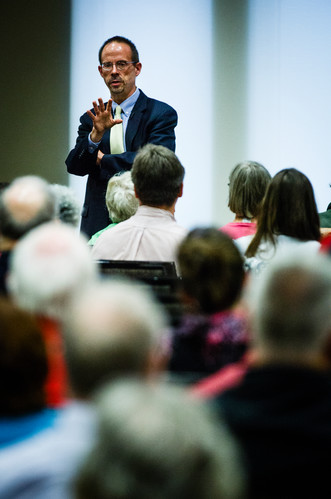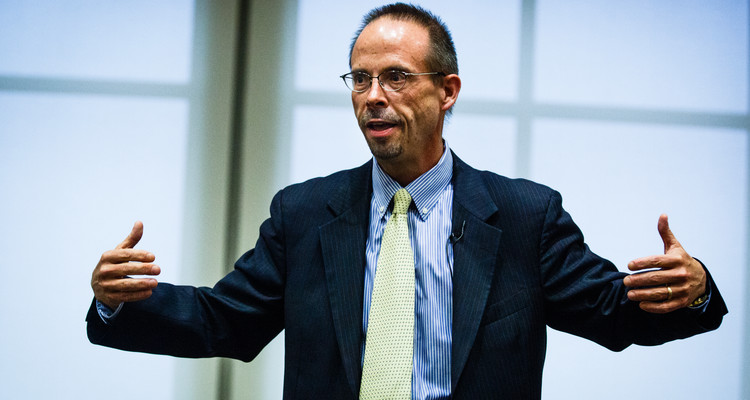In anticipation of Pope Francis’ social encyclical on the environment, Laudato Si, the United States Council of Catholic Bishops and the Pontifical Council for Justice and Peace collaborated with Michael Naughton and Billy Junker from the Center for Catholic Studies, and Christopher Thompson from The Saint Paul Seminary School of Divinity, to bring together a group of scholars and practitioners to discuss the relationship between human and natural ecology. The seminar, “Human and Natural Ecology: Economic, Political and Cultural Implications,” was held June 3-5, 2015, at The Saint Paul Seminary School of Divinity.

John L. Allen, Jr., associate editor at the Boston Globe, speaks in Woulfe Alumni Hall June 3, 2015.
During the opening session, Jonathan Reyes, executive director of the USCCB and an advisory board member of the Center for Catholic Studies, asked participants to let “the mind of the Church … give as much breadth and expertise to the ecological conversation as possible, from a shared starting point, in a logical, informative manner.”
In his keynote address, associate editor for the Boston Globe John L. Allen Jr. stressed that the Catholic Church has promoted the importance of the connection between human well-being and nature long before Francis became pope. He also predicted the encyclical would be widely misinterpreted in four ways:
- As a political manifesto and not a moral and spiritual document;
- As a radical break from Catholic tradition;
- As a historical reconciliation between the Church and science as though they were at odds with each other; and
- That Pope Francis is a liberal.
Because these misinterpretations will make it difficult for Laudato Si’s core theological and moral message to break through, his plea to the conference participants was to help in making Francis’ message clear to the wider public.
In response to this, several University of St. Thomas faculty including John Abraham (School of Engineering), Thompson, Junker and Naughton, as well as Calvin DeWitt from the University of Wisconsin, wrote an op-ed piece in the Minneapolis Star Tribune when the encyclical was published. They stated, “We can’t fully understand natural ecology without an understanding of human ecology and vice versa. Natural ecology is necessary for us to survive, but human ecology is critical for us to thrive and flourish. Francis wants to reconnect that the nature ‘out there’ is inextricably connected to the human nature in each of us. He believes that what happens in the family, as well as in education, business and other human institutions, have direct implications to what is happening in our natural environment. We are not only subject to biological laws but to moral ones as well.”
View the papers presented at the conference, a video of Allen’s lecture and a copy of the encyclical, Laudato Si here.
